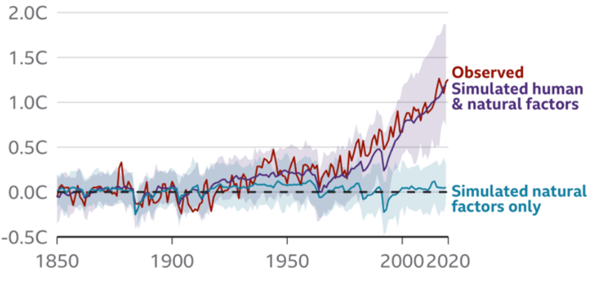The UN Intergovernmental Panel on Climate Change (IPCC), a group of scientists whose findings are endorsed by the world’s Governments, have this month released a sombre assessment of our planet’s future.
The landmark report has concluded that global heating is now, in some ways, irreversible and “it is unequivocal that human influence has warmed the atmosphere, oceans and land”.
Across the globe, human-induced climate change is already evident, with weather extremes such as heatwaves, heavy flooding, droughts and tropical storms being more frequent and intense since the 1950s. The past five years have been the hottest on record since 1850, and it is reported that since 1970 the global surface temperature has risen faster than in any other 50-year period over the past 2,000 years. The graph below demonstrates how the human race has driven this increase in temperature and clearly shows the growth which has occurred over the last 50 years.
Change in average global temperatures relative to 1850-1900, showing observed temperatures and computer simulations.
Note: Shaded areas show possible range for simulated scenarios
Source: IPCC, 2021: Summary for Policymakers
Despite the stark reality and potentially disastrous future which this report highlights, not all hope is lost. However, it is fundamental that immediate action is taken by us all if we hope to halt and, in some instances, reverse the trauma which the ecosystem has long suffered. The hope is that, if we can cut global emissions in half by 2030, and reach net zero by 2050, then this might be achievable.
The UK Energy White Paper: Powering Our Net Zero Future, sets out how the country intends to transform energy. The combustion of fossil fuels to produce energy results in a significant amount of greenhouse gas emissions. It is widely acknowledged that the way we produce energy requires a decisive shift away from fossil fuels to using clean energy for electricity generation. Decarbonising the energy system over the next 30 years means replacing fossil fuels with clean energy technologies such as renewables, which will become the predominant form of energy.
Delivering this transition will require billions of pounds of investment in clean energy infrastructure, and critical to this is suitable sites to host the projects. Wind already provides 10GW of renewable energy generation in the UK, but the focus remains offshore at present. Large-scale ground mounted solar PV developments offer an alternative and is recognised as another reliable form of renewable energy to help diversify the UK’s energy mix. On solar PV alone, Carter Jonas is advising developers and landowners on projects set to deliver more than 4GW of new capacity and see a continued growth in demand for more development sites. The prospect is both environmentally friendly and commercially attractive, with falling panel prices maintaining the project returns for developers and land rental figures typically between £800 to £1,000 per acre offering landowners index linked base rents for up to 40 years.
As the demand for renewable energy continues to grow and pressures to combat global warming increase, Carter Jonas would encourage any interested landowners to get in touch. Please contact Rosalyn Gledhill in the Energy team via rosalyn.gledhill@carterjonas.co.uk
View this month’s energy news >>
View the latest energy market update >>



